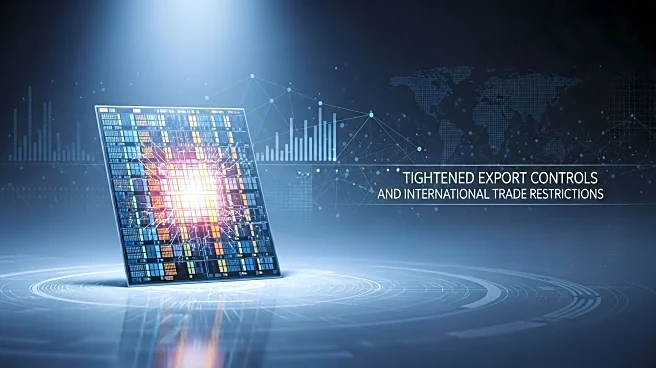What is the story about?
What's Happening?
The United States has announced a significant policy shift by revoking licenses for the unconditional export of equipment using American technologies to Chinese semiconductor fabs operated by TSMC, SK Hynix, and Samsung. This change, effective next year, is expected to limit production capabilities and potentially threaten operations at these facilities. The move reverses previous incentives that allowed these companies to supply critical equipment, highlighting the U.S.'s influence in the global chip supply chain. The U.S. Department of Commerce described the policy change as closing an export loophole, with licenses now issued to maintain current operations without expanding capacities or modernization.
Why It's Important?
This policy shift by the U.S. could have significant implications for the global semiconductor market, particularly affecting memory chip production. Analysts warn that delays in licensing could disrupt overseas operations and increase prices for memory chips manufactured by Samsung and SK Hynix in China. These companies account for substantial shares of the global NAND and DRAM markets, indicating a high dependence on external equipment and suppliers. The restrictions may push these companies to expand memory capacities in the U.S., potentially altering competitive dynamics in the semiconductor industry.
What's Next?
SK Hynix has stated it will take necessary steps to minimize the impact of these changes, maintaining dialogue with the governments of Korea and the U.S. Meanwhile, Samsung has declined to comment. Taiwan's Ministry of Economic Affairs noted that U.S. actions could create uncertainty for TSMC's operations in mainland China, although the impact on Taiwan's competitiveness is expected to be limited. In the long term, China may ramp up its own memory production, but tightening U.S. controls could accelerate resource reallocation towards domestic development.
Beyond the Headlines
Reduced access to foreign technologies could shift the balance of power in the semiconductor market. While Chinese manufacturers may gain momentum in the short term, global supply chains will remain sensitive to political decisions. This development underscores the geopolitical dimensions of technology and trade, with potential long-term shifts in manufacturing strategies and international relations.















